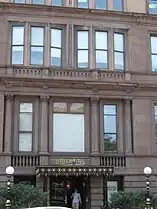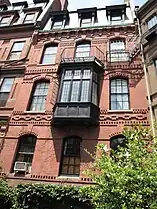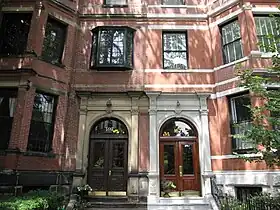J. Pickering Putnam
J. Pickering Putnam (April 3, 1847 – February 23, 1917), also known as J. P. Putnam or John Pickering Putnam, was an American architect and designer who "pioneered the concept of the modern apartment building."[1] He designed several buildings in the Back Bay area of Boston, Massachusetts. He earned a number of design patents related to plumbing, ventilation, and the like, such as US Patent No.563,064 (1896), a design for a washbasin.[2]
J. Pickering Putnam | |
|---|---|
_c._1908.png.webp) | |
| Born | John Amory Putnam April 3, 1847 Boston, Massachusetts |
| Died | February 23, 1917 (aged 69) Boston, Massachusetts |
| Education | Harvard College |
| Occupation | Architect |
| Spouse |
Grace Cornelia Stevens
(m. 1885) |
| Children | 2 |
Brief biography
_c._1868.png.webp)
Putnam was born as "John Amory Putnam" in Boston in 1847, to John Pickering Putnam (1813-1867) and Harriet Upham (1820-1905).[3] He was one of four children; his siblings were Mary Upham Putnam (1843-1920); Harriet Putnam (b. 1845); and Sarah Gooll Putnam (1851-1912), a painter.[1][4]
Putnam graduated from the Boston Latin School, and from Harvard College in 1868. He then trained at the École des Beaux-Arts, Paris, in 1869, and the Royal Academy of Architecture, Berlin, 1870-1872.[5][6] "The war interrupted his studies. Leaving Paris for Berlin, he was twice arrested as a Prussian spy, while sketching in the streets."[7]
On returning to the US in 1872 he began practicing architecture and was associated professionally with George Thomas Tilden. In 1885 Putnam married Grace Cornelia Stevens; they had 2 children: Grace Elizabeth Putnam (b. 1887) and John Pickering Putnam Jr. (b. 1892).[7] He was a member of the Boston Society of Architects; St. Botolph Club; Portfolio Club of Boston; and The Cold Cut Club of Boston.[7]
He died at the Charlesgate Hotel in Boston on February 23, 1917.[8]
Selected designs

- 1872 – George S. Draper house, Hopedale, Massachusetts (demolished)[9][10]
- 1872 – Cottage, Nahant, Massachusetts (Remodel, with George T. Tilden)[11]
- 1875 – House, 63 Marlborough Street, Boston, Massachusetts[5]
- 1876 – Hotel Cluny, 545-547 Boylston Street, Boston, Massachusetts (demolished).
- 1877 – Manhattan Beach Hotel, Coney Island, New York[12]
- 1878 – House, 277 Dartmouth Street, Boston, Massachusetts[5]
- 1878 – House, 167 Marlborough Street, Boston, Massachusetts
- 1881 – House, 195 Commonwealth Avenue, Boston, Massachusetts
- 1884 – House, 399 Marlborough Street, Boston, Massachusetts[13]
- 1890 – Charlesgate Hotel, 535 Beacon Street, Boston, Massachusetts[14][15]
- 1891 – Langmaid Terrace, 359-365 Broadway, Somerville, Massachusetts[16]
- 1894 – Haddon Hall, 29 Commonwealth Avenue, Boston, Massachusetts[17]
- 1896 – Commonwealth Hotel, Boston, Massachusetts[15][18][19]
Image gallery
 Haddon Hall, Boston
Haddon Hall, Boston 63 Marlborough St., Boston
63 Marlborough St., Boston 167 Marlborough St., Boston
167 Marlborough St., Boston
Works
- The metric system of weights and measures. 1877.
- The open fire-place in all ages. 1880.
- Improved Plumbing Appliances. 1887
- Architecture under nationalism. 1890.
- The outlook for the artisan and his art. 1899. "The author shows how the change, from the profit system to Nationalism, will relieve the artisan from anxiety and enable him to put art into his daily work to an extent that the world has never yet seen."[20]
- Plumbing and household sanitation. 1911.
References
- Erin L. Pipkin. "'Striking in Its Promise': The Artistic Career of Sarah Gooll Putnam". The Massachusetts Historical Review, Vol. 3, (2001); p.99.
- United States Patent Office. Washbasin, 86C. Patent No. 563,064, dated June 30, 1896.
- The Harvard graduates' magazine, v. 25. 1917; p.622.
- "Portrait of a Lady". Boston Herald. Boston, Mass.: March 27, 1998. p. 45.
- Bainbridge Bunting. Houses of Boston's Back Bay: An Architectural History, 1840-1917. Harvard University Press, 1999.
- Bryant Franklin Tolles. Summer cottages in the White Mountains: the architecture of leisure and recreation, 1870 to 1930. University Press of New England, 2000.
- Harvard College Class of 1868 Fortieth Anniversary Secretary's Report No. 8. Boston: E. O. Cockayne. 1908. pp. 116–118. Retrieved April 21, 2023 – via Google Books.
- "John P. Putnam Dead". The Boston Globe. February 24, 1917. p. 2. Retrieved April 21, 2023 – via Newspapers.com.
- American architect and building news 49, no.3. August 1895.
- Elaine Malloy, Daniel Malloy, Alan J. Ryan. Hopedale. Arcadia Publishing, 2002; p.60. Includes illustration of the house.
- Portfolio Club. The sketch book, no.6. Boston: 1873. Includes illustration of the cottage.
- Jeffrey W. Limerick. "The Grand Resort Hotels of America". Perspecta, Vol. 15, Backgrounds for an American Architecture (1975); pp. 87–108.
- "J. Pickering Putnam". BOSarchitecture.
- "Ask the Globe". The Boston Globe. July 15, 1986. p. 72. Retrieved April 21, 2023 – via Newspapers.com.
- Catalogue, joint exhibition of the Boston Society of Architects and the Boston Architectural Club, from April 15 to April 21. Boston: published for the Committee by Bates & Guild, 1895
- "The Langmaid Block, Somerville, Mass.," American Architect and Building News 32, no. 809 (June 27, 1891): 199.
- "Back Bay landmark undergoes updating". The Boston Globe. August 13, 1989. p. 130. Retrieved April 21, 2023 – via Newspapers.com.
- "Work Will Be Commenced in the Spring; Commonwealth Hotel, Largest Structure in the World, Will Soon be Erected on the Back Bay". Boston Daily Globe. February 2, 1896. p. 16. Retrieved April 21, 2023 – via Newspapers.com.
- American architect and building news. 1896
- The Annual American Catalogue 1899. 1900. p. 173.
Further reading
- "Our plumbing laws; Views of an Expert Upon the Sanitary Requirements of Dwelling Houses". Boston Daily Globe January 3, 1885. p. 6.
- "Work for the unemployed; Cooperative Association to Hold Mass Meeting. Several Prominent Men to Speak in Faneuil Hall Tomorrow Night. Rev Henry Vrooman, the President, Explains the Object of the Organization". Boston Daily Globe. December 3, 1900. p. 10.
- Deborah Fulton Rau. "John Pickering Putnam (1847-1917), Visionary in Boston: A Systematic Approach to Apartment House Design". Architectura 22 (1992).
External links
- WorldCat. Putnam, J. Pickering (John Pickering) 1847-1917
- Open Library. Works by J. Pickering Putnam
- Flickr. Charlesgate East
- . Encyclopedia Americana. 1920.